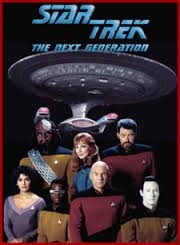
Interestingly, perhaps inevitably, all Star Trek series begin with a two-hour (sometimes broken into two parts) premiere episode, and so it is with the first to pick up the baton after Kirk and Co had warped off into hypergalactic retirement, Star Trek: The Next Generation. This is often tricky, as if you make it too boring (as in “The Cage”) you can damage your prospects of being picked up by the network. But while “Encounter at Farpoint” is far from the best TNG episode, even in season one, there was never a danger of it not being picked up, as it was to be the triumphant return of the franchise after over twenty-five years in the wilderness, and the audience was certainly there for it. More, there were two distinct audience demographics: those who had grown up on the original and were either salivating at the prospect of its return (or waiting to tear it apart with savage commentary and criticism; didn’t matter, they still had to watch it first) and those who either had never seen it and were interested, or else were just science-fiction fans. There wasn’t much of sci-fi on the TV at that time, and so anything even vaguely space related was welcome. Plus TNG was coming in on the cusp of a new sci-fi revival, with films like Star Wars, Alien, ET and Blade Runner, to say nothing of four Trek movies whetting the appetites of sci-fi enthusiasts young and old. It was, in short, a great time for the Return of the King.
But any show that has reached such iconic, almost legendary status is going to be hard to replicate, and the inevitable comparisons would be made, so how to make this not simply a continuation of the original series, but a quantum leap forward? Well, plenty of ways. First of all, while maintaining the accepted family atmosphere aboard ship, the “power trio” idea had to be dispensed with. The original Star Trek had mostly focussed on Kirk, Spock and McCoy, with occasional contributions from the likes of Scotty, Uhura or Sulu, and later Chekov, but I don’t think there’s one episode in the entire three-season run that did not feature all three of the main characters. This put the others at a disadvantage, relegating them to the position almost of bit players, guest stars even. An episode would survive the absence of Sulu or Scotty, and much of the time Uhura was just a glorified telephone operator, but the three main men always had to be in the camera’s crosshairs.
TNG sought to do away with that to an extent. While it’s true that the captain was, and always would be, the centre of any action, this new series “farmed out” or even shared out the adventure. It would not be unheard of for Doctor Crusher, Geordi or Worf to have their own episode, and even the “kid” on board, Wesley, would feature prominently in later ones. Relationships would be explored and developed, and to a much greater degree than had been in the original series, where little more than a hint that Nurse Chapel was in love with Spock was allowed, or references were made to Kirk’s many ex-girlfriends and conquests. Here, everyone was related in one way or another. Geordi and Data would become fast friends. Riker and Troi had past history they were still trying to get past, and even the captain had a romantic interest in the doctor, although it would be some time indeed before he would admit it, more before he would act on it.
The crew was larger, the ship more powerful and majestic, and the storylines would of course be more far-reaching, deep and intelligent, and there would be, by and large, little of the easy humour for which Star Trek had become known. Picard was a hard man, an authoritarian who seldom smiled, disliked and distrusted children, and seemed to have few hobbies other than reading. He was a solitary man, alone among over a thousand souls, with responsibility for their safety, and though his crew were loyal to him and would follow him into Hell, at first he does come across rather a little like Christopher Pike on his one and only voyage aboard the USS Enterprise.
“Encounter at Farpoint”
On the way to Deneb IV, the new USS Enterprise, under the command of Captain Jean-Luc Picard, is heading towards its first mission. A starbase has been built there, called Farpoint Station, and the Federation wish to know how it was built so quickly and if more can be built. Picard is yet awaiting the arrival of his ship’s doctor and first officer, who are to meet them at the station. En route though they are suddenly accosted by a malevolent intelligence which manifests upon the ship’s bridge, calling itself “The Q”. It accuses the human race of being a “dangerous, savage child race” and directs Picard and his crew to return to their home planet. Picard of course refuses, loudly proclaiming the advances humanity has made, and the creature, seemingly intrigued by the captain’s ideas of testing them, retires, promising to return.
The Q has however blocked the path of the Enterprise with a weblike net, which Picard now attempts to break away from. He prepares the ship for “saucer separation”, a procedure which will detach the main bridge in the flat, disc-like section of the top of the ship from the main body. As they accelerate away from the net it follows them, and they find it impossible to outrun. Picard orders the saucer separation, and despite his chagrin, Worf is ordered to take command of the saucer section, into which all the women and children have been herded. The remainder of the ship, now known as “the battle bridge” turns to take on the “hostile” as it gains on them. It is however a futile action, and Picard reluctantly orders their surrender.
Once he does, they all find themselves in a courtroom, where the judge is none other than the intelligence known as The Q. Troi confirms that, though the scene they are in is out of the late twenty-first century, and cannot be real, must be an illusion, it is real. The Q again accuses the crew of being savage and dangerous, and tricks them into admitting their guilt under duress. Outmanoeuvred, Picard puts forward a challenge: let the Q test him and his crew, let them represent what mankind has become, and let him see if they have in fact evolved beyond what the powerful alien accuses them of. The Q is satisfied, even happy with the outcome, and tells Picard that solving the mystery of Farpoint Station will serve as his litmus test. The court dissolves, and Picard and his crew are back aboard their vessel.
Meanwhile, at Farpoint Station, Commander William Riker awaits the arrival of the Enterprise and visits the man in command of the station, an alien named Zorn. He expresses amazement that the station could have been built so quickly, and so perfectly suited to the needs of the Federation. Zorn is evasive, refusing to answer questions, but when Riker has left he seems annoyed and berates something above him, almost as if he is talking to the ceiling. He talks of “arousing their suspicion”, and it’s clear that something here does not meet the eye. Riker meets up with the ship’s doctor, Beverley Crusher, who is also awaiting the arrival of the ship. He tells her and her son, Wesley, that he has noticed odd things about this station. Just now, he had wanted an apple and though there was none in the bowl proffered him by Zorn, a moment later there was another bowl which he could swear had not been there, and yes, it had apples in it. Similarly, Crusher looks at some cloth and notes it would be nice if there were a gold pattern on it, and suddenly there is. She of course thinks he’s seeing conspiracies where none exist, and looking for ways to impress his new captain, but he is sure it’s more than just an overactive imagination.
Riker is somewhat surprised to learn that Crusher is on first-name terms with the new captain, but Wesley advises him that it was Picard who brought the body of his father home, when he fell in an away mission, some years ago. Geordi LaForge, navigator aboard the ship and also awaiting its arrival so that he can take his position, reports to Riker that the ship has reached orbit but is missing the saucer section. Picard has ordered Riker to beam aboard immediately, as he does. Almost right away he is shown footage of what has transpired with The Q, and then Picard receives news that the saucer section is ready to reunite with the main ship. Seeing this as an early test of his first officer’s competence and his ability to work under pressure, the captain orders Riker to conduct the reintegration of the ship, manually, a task he carries out perfectly. Picard grudgingly congratulates him on his prowess, though calls it “a fairly routine manoeuvre.” He does however take issue with his new second-in-command’s determination to second-guess the captain when he deems he is putting himself in unnecessary danger.
Here though the mask slips a little and Picard allows himself a moment of weakness, as he admits he is not good with children, and asks, well orders I suppose, Riker to help him in that area. LaForge shows Crusher his visor, a computer implant that allows him to see, even though he is blind. Usage of the implant does cause him pain, but he suffers it in order to be able to see, even if he does not see the same way we do: his visor detects electromagnetic waves, colour spectrums etc. Riker is looking for Data, but Worf tells him that the android is on “special assignment”, ferrying a special guest, an admiral, to the Enterprise by shuttlecraft. This turns out to be McCoy, in what’s a pretty shamefully self-indulgent cameo that lasts about a minute. As they prepare to leave Farpoint, The Q appears again on the viewscreen, advising them that if they do not solve the problem in twenty-four hours they risk summary judgement against them.
Riker is reintroduced to Deanna Troi, the Ship’s Counsellor, but Picard is unaware they are ex-lovers. Troi is half Betazoid and therefore telepathic, and she and Riker share an uncomfortable, though private moment when she speaks to his mind only. They keep their relationship from the captain, admitting only that they know each other. All three beam down to the station and meet with Zorn, who is less than happy at Deanna’s presence, she being a telepath. He is also annoyed at Picard’s attempts to get him to agree to build other starbases for them, or to trade for the materials and knowledge that allowed them to build Farpoint. He makes it clear he is interested in entertaining neither suggestion, and just wants to sell the rights to use this station alone. While there, Troi experiences powerful emotions — negative, painful ones, ones of loss and despair, but she can’t say from where these feelings are emanating. As the exchanges get more heated, and all their questions continue to be evaded, the trio leave a fuming Zorn, unsure of what is going on.
Riker gets his first taste of the brand new Holodeck, a holographic projection room on the ship which can be programmed for any environment, scene or fantasy. He is looking for Data and finds him here, as well as Wesley Crusher. Data shows how superhumanly strong he is when he lifts Wesley with one hand when the kid falls into a holographically-created, but very real and very wet, stream. Riker also finds out, to his amusement, that the one thing Data wishes is to be human. He has not the software to accomplish this, but is trying to add to his programme by trying things like whistling, and hopes that by better studying humans and coming to understand them, he may one day emulate them. In the tunnel below Farpoint Station, Geordi is unable to identify the material the walls are constructed from, and Deanna receives even harsher images and emotions, making her sink to her knees in despair.
A strange alien vessel arrives and begins to attack the planet, firing unknown weapons down at the city below. It does however appear to be avoiding hitting the station itself. It refuses to respond to hails, and Zorn professes to know nothing about it, though Picard is loath to believe him. He knows, all right: it’s in his voice. He’s hiding something, and the arrival of the alien vessel has thrown him into almost a panic. Picard orders Riker, still on the planet, to bring him to the Enterprise where they will get what information he has out of him. However, before they can do so someone else teleports him away. Troi begins to sense a new emotion: satisfaction, but it is not from the same source. The Q reappears, gloating over Picard’s inability to solve the conundrum, goading him that he has not the brains to figure it out. Q, tiring of their efforts and looking to be amused, gives them a clue: beam over to the alien vessel, he advises them, and though Picard is against it Riker volunteers to go, which impresses the seemingly-omnipotent alien.
Picard goes to Crusher, to apologise for his stiff and overly formal welcome to her: she is an old friend, or at least the wife of an old friend, and he should have been more forthcoming. He tells her that serving aboard the Enterprise may be hard for her, being constantly reminded of her husband through him, and suggests a transfer, which he will approve, but she turns him down, saying she is where she needs and wants to be. In fact, she tells him, she requested the post. On the alien vessel, Troi Data and Riker find Zorn held captive and in pain, while the empath feels anger, revenge, satisfaction from a much closer source than before.
As they rescue Zorn, Q reappears on the bridge, sneering at Picard’s efforts to unravel the mystery, but when the away team returns, sent back by the alien vessel, he begins to see it. The vessel is not a ship but a living being, and it is trying to help — rescue — one of its own kind which has been trapped on the planet surface below. Creatures who can convert energy into matter, the second alien was pressed into service by Zorn and his people, forced to assume the shape of Farpoint Station, and allowed only enough energy to survive but not to break free. Picard has the Enterprise beam energy down to it, allowing it to break free and join its mate. Farpoint Station is no more, the duplicity has been uncovered, Q is disappointed that the humans solved the puzzle and vanishes in a huff. Picard leans forward and declares “Let’s see what’s out there!”
Quotes
Troi: “Captain! I’m sensing a powerful mind. Massively powerful!”
(Picard surely wants to blush, and say “Well, I wouldn’t say massive, but if you insist…”!  )
)
Data: “It registers as solid, Captain.”
Troi: “Or an incredibly powerful forcefield! Captain, if we collide with it at this speed—”
Picard: “Shut off that damn noise!”
(Picard is referring to the red alert warning, but you can just hear Deanna grumping “I’m only saying. No need to be rude!” 
Picard: “Let’s see what this “Galaxy”-class starship can do!”
Picard: “Commander, signal the following in all languages and on all frequencies: we surrender.”
(And a generation of Trekkers put their heads in their hands and groan “Kirk would never have surrendered!” Welcome to the new generation…)
Zorn (to the air apparently): “You have been told not to do that! Why can’t you understand? It will arouse their suspicion, and if that happens, we will have to punish you! We will, I promise you!”
Picard: “I’m not a family man, Riker, and yet Starfleet has given me a ship with children aboard. I’m not comfortable with children. But since a captain needs an image of geniality, you’re to see that’s what I project.”
McCoy: “I see no points on your ears, boy, but you sure sound like a Vulcan!”
Data: “No, Sir. I am an android.”
McCoy: “Hmph! Almost as bad!”
Picard: “Counsellor, may I introduce our new First Officer, Commander William Riker. Commander, this is our Ship’s Counsellor, Deanna Troi.”
Troi: “A pleasure, Commander.”
Riker: “Likewise, Counsellor.”
Picard: “Have you two met before?”
Riker: “Yes sir, we have.”
Picard: “Excellent. I consider it important for my key officers to know each other’s abilities.”
Troi: “We do sir, we do.”
(How little he knows of their shared history, and the unheard telepathic message Troi sends to her “Imzadi”!)
Zorn: “Captain! The Ferengi would be very interested in a base such as this!”
Picard: “Fine. Let’s hope they find you as tasty as they did their past associates!”
Riker: “But you’re …”
Data: “A machine, Sir, yes. Does that trouble you?”
Riker: “Honestly, yes.”
Data: “Understood, Sir. Prejudice is very human.”
Riker: “Now that does trouble me. Do you consider yourself superior to humans?”
Data: “I am superior, Sir, in many ways. But I would give it all up, to be human.”
Riker: “Nice to meet you, Pinocchio.”
Picard: “Some problem, Commander?”
Riker: “Just wondering if all our missions will go this way, Sir?”
Picard: “Oh no, Number One. I’m sure most of them will be much more interesting. Let’s see what’s out there.”
Parallels
There’s a very distinct similarity here in what Q is doing to what Squire Trelayne made Kirk undergo in “The Squire of Gothos.” He, too, was a judge and accused Kirk, whom he then hunted.
There are also slightly less similar, but still alike, parallels to be drawn with “Devil n the Dark”, in which the killer of miners on a planet is found to be a creature that can burrow through solid rock, and which is killing in revenge for the destruction of its eggs, cracked when the miners broke into a shaft which was in fact the creature’s nursery.
It wasn’t meant to be this way!
Sometimes ideas were barely pencilled in and fleshed out later, so that things changed over the course of the series, many of them taking on totally different aspects and meanings than they were originally intended to have.
Q, presented here as a dark, evil, all-powerful enemy, would soon become the butt of jokes, a nuisance, an annoyance and at one point, an unwilling member of the crew. He would become a source of comic relief, but one thing that would always be true was that, like Mister Burns in any episode of The Simpsons, you could be guaranteed a good story if he were in it.
Data, the android officer, quickly loses his stilted syntax, where he prefaces each statement with a qualifier, such as “Inqury: blah blah” or “Supposition: blah bah.” This would probably have got old very quickly, and was in fact dispensed with by the end of this episode.
The Ferengi are here mentioned only, and painted as a deeply unlikeable race who seem quite savage. When we actually meet them, in “The Last Outpost”, for the first time, and later, in “The Battle”, this image will be kept up to an extent. But fairly quickly it becomes obvious that the Ferengi, small with huge ears and an abiding passion for wealth and its creation, and retention, are more comic relief than anything. In fact, of all the many characters and races throughout all series and incarnations of the programme, none would come to be more loved and give us more amusement than the Ferengi, especially when we get to Deep Space 9 and meet Quark. But that’s for another time. For now, all I can say is that whatever they were meant to start out as, the Ferengi became something totally different, a real and true example perhaps of a character or type taking over its own destiny, and writing itself as it wanted to be written.
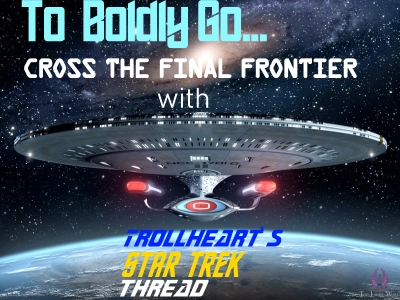





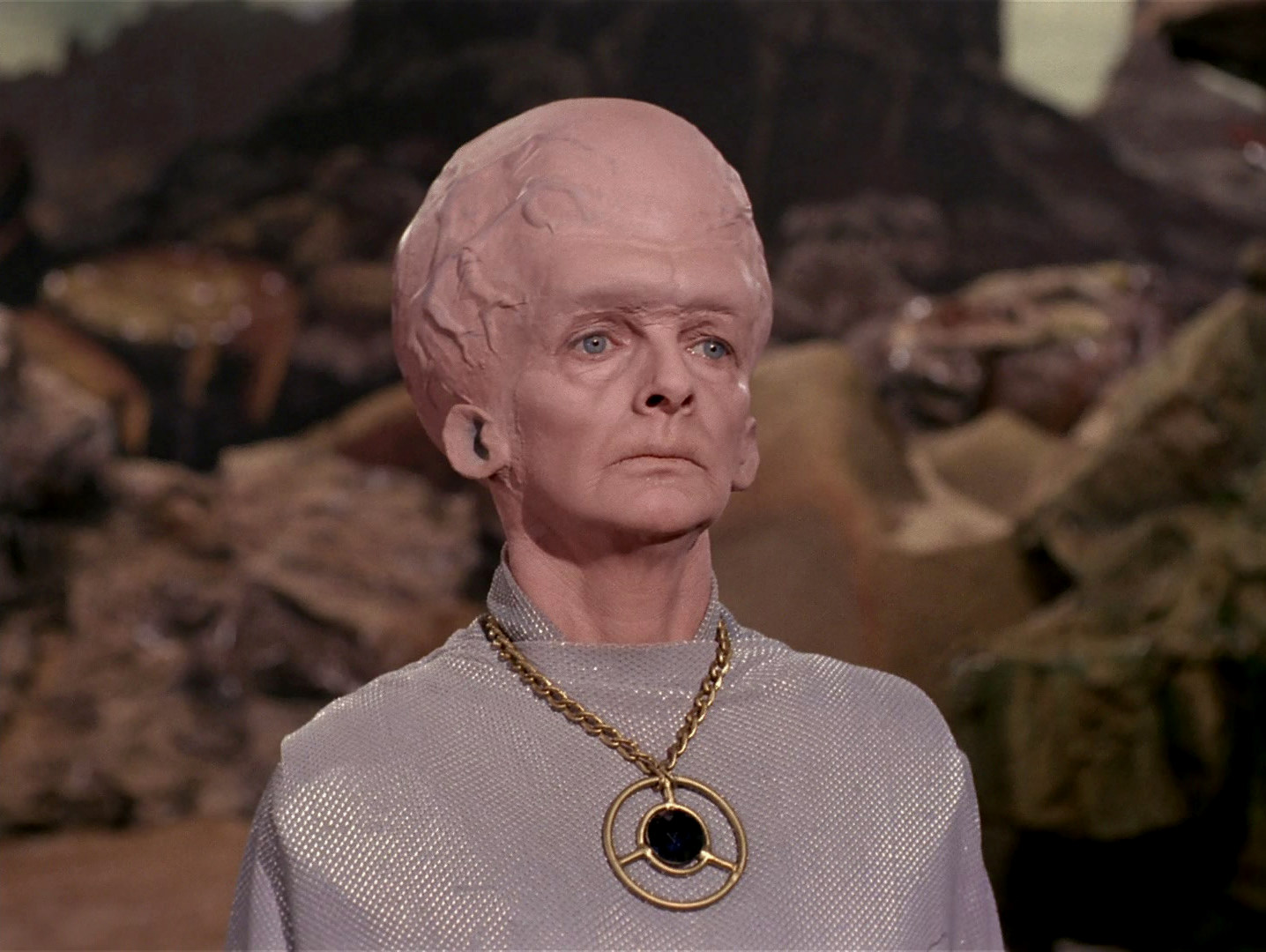
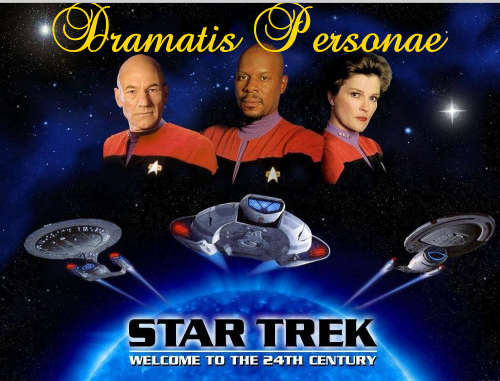
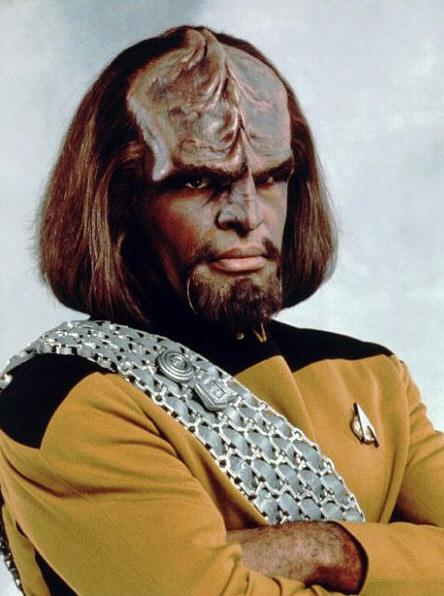
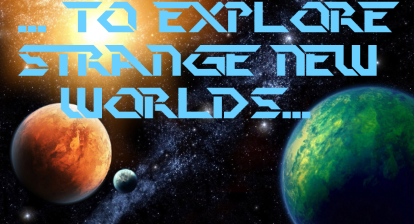
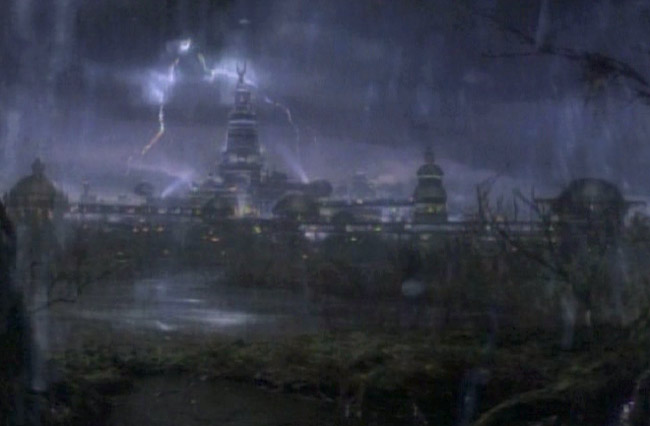
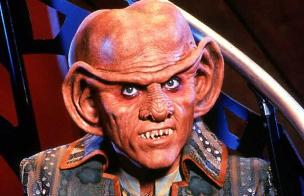
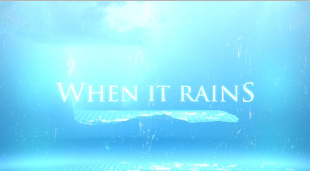



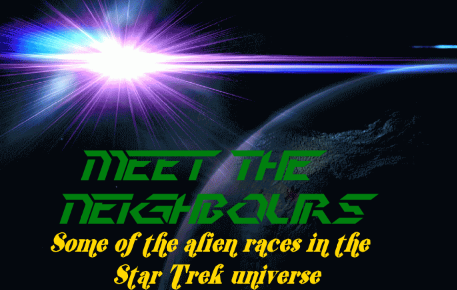



 )
)